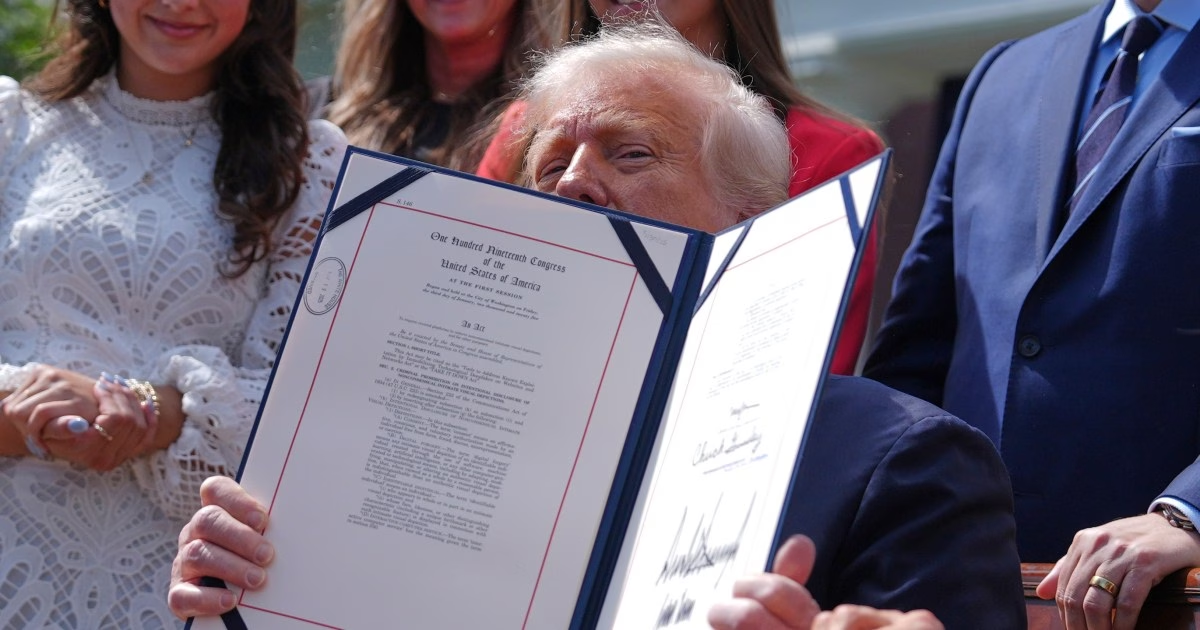Bill criminalizes sharing intimate photos, even those created by AI as ‘deepfakes,’ without permission.
United States President Donald Trump has enacted legislation criminalizing distributing so-called “revenge porn,” including images produced with the aid of artificial intelligence.
The Take It Down Act, endorsed on Monday, classifies disseminating explicit images of an individual without their approval as a federal offense, compelling social media platforms to erase such content within 48 hours upon request by victims.
The act, backed almost unanimously by the US Congress earlier this year, extends to lifelike AI-generated “deepfakes” and authentic photos.
“As AI image synthesis has grown, infinite women have been tormented by deepfakes and other lewd images circulate without their approval. It’s … incorrect … blatantly incorrect,” Trump declared during a signing event at the White House in Washington, D.C.
“It portrays an incredibly aggressive circumstance … And today we are making it completely unlawful.”
First Lady Melania Trump, who advocated for the legislation after her spouse’s return to the White House, called the law a “significant step forward in our quest to safeguard every American, especially the youth, from the misuse of their image or identity.”
Although the bill boasts of rare bipartisan support and endorsements from numerous organizations committed to battling sexual harassment and assault, it has been criticized by digital rights organizations on the grounds of privacy and opposition to censorship.
The Electronic Frontier Foundation stated that the law’s provisions for expunging flagged content from the internet increase the risks to “free expression, user privacy, and due process, without resolving the issue it aims to address.”
“Legal content—including satire, journalism, and political expression—may be improperly suppressed,” the group responded in a February statement.
“The bill’s strict deadline calls for apps and websites to eliminate content within 48 hours, leading online service providers, especially smaller ones, to have to respond so promptly that they’ll be incapable of validating claims. Consequently, automated filters will be employed to detect duplicates, yet these systems are notorious for flagging legal content such as fair-use assessments or news reporting.”
The Take It Down Act, endorsed on Monday, classifies disseminating explicit images of an individual without their approval as a federal offense, compelling social media platforms to erase such content within 48 hours upon request by victims.
The act, backed almost unanimously by the US Congress earlier this year, extends to lifelike AI-generated “deepfakes” and authentic photos.
“As AI image synthesis has grown, infinite women have been tormented by deepfakes and other lewd images circulate without their approval. It’s … incorrect … blatantly incorrect,” Trump declared during a signing event at the White House in Washington, D.C.
“It portrays an incredibly aggressive circumstance … And today we are making it completely unlawful.”
First Lady Melania Trump, who advocated for the legislation after her spouse’s return to the White House, called the law a “significant step forward in our quest to safeguard every American, especially the youth, from the misuse of their image or identity.”
Although the bill boasts of rare bipartisan support and endorsements from numerous organizations committed to battling sexual harassment and assault, it has been criticized by digital rights organizations on the grounds of privacy and opposition to censorship.
The Electronic Frontier Foundation stated that the law’s provisions for expunging flagged content from the internet increase the risks to “free expression, user privacy, and due process, without resolving the issue it aims to address.”
“Legal content—including satire, journalism, and political expression—may be improperly suppressed,” the group responded in a February statement.
“The bill’s strict deadline calls for apps and websites to eliminate content within 48 hours, leading online service providers, especially smaller ones, to have to respond so promptly that they’ll be incapable of validating claims. Consequently, automated filters will be employed to detect duplicates, yet these systems are notorious for flagging legal content such as fair-use assessments or news reporting.”
Source: https://www.aljazeera.com/news/2025/5/20/trump-signs-bill-outlawing-revenge-porn?traffic_source=rss









